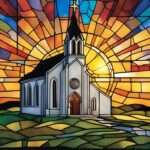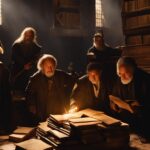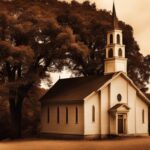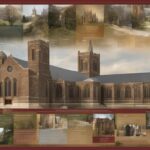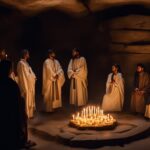The Evangelical Free Church of America (EFCA) has a rich history rooted in the merger of two denominations – the Swedish Evangelical Free Church and the Norwegian-Danish Evangelical Free Church Association in 1950. This merger brought together two groups that shared a common commitment to the Evangelical faith and established the foundation for what would become the EFCA.
The EFCA’s origins can be traced back to the Radical Pietistic movement, a revivalist movement within Protestant Christianity that emphasized a personal and transformative relationship with Jesus Christ. This movement sought to bring about spiritual renewal and a deeper commitment to the teachings of the Bible.
Throughout its history, the EFCA has maintained strong affiliations with other evangelical organizations, including the National Association of Evangelicals and the International Federation of Free Evangelical Churches. These affiliations have helped the EFCA to foster strong relationships within the broader evangelical community and to engage in important collaborative efforts.
Key Takeaways:
- The Evangelical Free Church of America (EFCA) was formed through the merger of two denominations in 1950.
- The EFCA is rooted in the Radical Pietistic movement, emphasizing a personal and transformative relationship with Jesus Christ.
- The EFCA maintains strong affiliations with the National Association of Evangelicals and the International Federation of Free Evangelical Churches.
- The EFCA’s history reflects a commitment to the Evangelical faith and collaborative efforts within the broader evangelical community.
Beliefs and Doctrines of the Evangelical Free Church
The Evangelical Free Church of America (EFCA) upholds a firm commitment to evangelical beliefs and doctrines that form the foundation of its practices and teachings. Central to the EFCA’s identity is the authority and inerrancy of the Bible, which serves as the ultimate source of truth and guidance for the church and its members.
At the core of the EFCA’s evangelical doctrine is the belief in the Trinity, acknowledging the Father, Son, and Holy Spirit as distinct yet equal persons of the Godhead. This understanding shapes the church’s view of God’s nature, character, and work in the world.
The EFCA also affirms the doctrine of atonement, emphasizing that Jesus Christ’s sacrificial death on the cross provides redemption and reconciliation for humanity. This belief is deeply rooted in the understanding that all individuals are born with original sin, separated from God, and in need of salvation.
Looking forward to the future, the EFCA firmly holds to the belief in the personal and imminent return of Christ. This eschatological hope shapes the church’s perspective on life, purpose, and the urgency of sharing the gospel with others.
Emphasizing the importance of ordinances, the EFCA recognizes and practices two sacraments: water baptism and the Lord’s Supper. These ordinances serve as visible signs and expressions of faith, symbolizing the believer’s identification with Jesus Christ and their participation in His redemptive work.
While the EFCA aligns closely with the Baptist tradition, it also acknowledges its historical ties to Lutheranism and the influx of former Methodists and Presbyterians in its early days. As a result, the EFCA allows for some flexibility in baptism practices, respecting the diverse backgrounds and convictions of its members.
The EFCA’s commitment to evangelical beliefs and doctrines, grounded in the authority of the Bible, provides a solid theological foundation for its mission and ministry as it seeks to proclaim the gospel, make disciples, and live out the teachings of Jesus Christ.

Sacraments and Rituals in the Evangelical Free Church
The Evangelical Free Church of America (EFCA) practices two sacraments that hold significant importance in the life of believers: water baptism and the Lord’s Supper. These sacraments are viewed as essential rituals that symbolize obedience and identification with Christ.
Water baptism is a visible representation of an individual’s faith in Jesus Christ and their commitment to follow Him. It is an outward sign of an inward transformation, a public declaration of one’s personal relationship with God. The EFCA emphasizes the authority of the local church in determining the mode and timing of baptism. Whether through full immersion or sprinkling, the act of baptism unites believers with the death, burial, and resurrection of Jesus.
The Lord’s Supper, also known as communion or the Eucharist, is a meaningful time of remembrance and thanksgiving. Through the sharing of bread and wine (or grape juice), participants commemorate the sacrificial death of Jesus on the cross and His resurrection. The elements symbolize His body broken for us and His blood shed for the forgiveness of sins. The EFCA acknowledges the personal choice of each individual in participating and encourages believers to examine their hearts before partaking in this sacred ritual.
The EFCA places great emphasis on the authority of the local church in determining the practices surrounding these sacraments. This recognizes the unique role and responsibility of each congregation to shepherd its members in matters of faith, while also providing freedom for personal choice and expression of belief.

| Sacraments | Significance | EFCA Approach |
|---|---|---|
| Water Baptism | Symbolizes obedience and identification with Christ | Authority of the local church to determine mode and timing |
| The Lord’s Supper | Remembrance and thanksgiving for the sacrifice of Jesus | Personal choice and examination of one’s heart before participation |
Leadership and Clergy in the Evangelical Free Church
In the Evangelical Free Church, leadership and clergy play vital roles in guiding and shepherding the congregation. The church operates under a congregational polity, which means that each local church has autonomy in its governance and decision-making processes. This model of leadership allows for active involvement and participation from the members, fostering a sense of ownership and shared responsibility.
The Leadership Conference serves as the governing body of the Evangelical Free Church. Composed of credentialed ministers, chaplains, faculty, and church representatives, this conference plays a significant role in shaping the direction and policies of the church. Through collaborative discussions and decisions, the Leadership Conference ensures that the church remains faithful to its mission and values.
Elections for the board of directors are conducted within the framework of the Leadership Conference. These elected individuals provide oversight and guidance to the various ministries and initiatives of the Evangelical Free Church. By leveraging their diverse skills and experiences, the board of directors helps to implement strategic plans and initiatives that align with the church’s vision.
The President of the Evangelical Free Church holds a crucial leadership role within the organization. As the head of the national boards and ministries, the President oversees the important work of licensing and ordaining ministers, ensuring the highest standards of professionalism and spiritual guidance within the clergy. Through servant leadership and steadfast commitment, the President plays a pivotal role in fostering unity and promoting the holistic growth of the Evangelical Free Church.
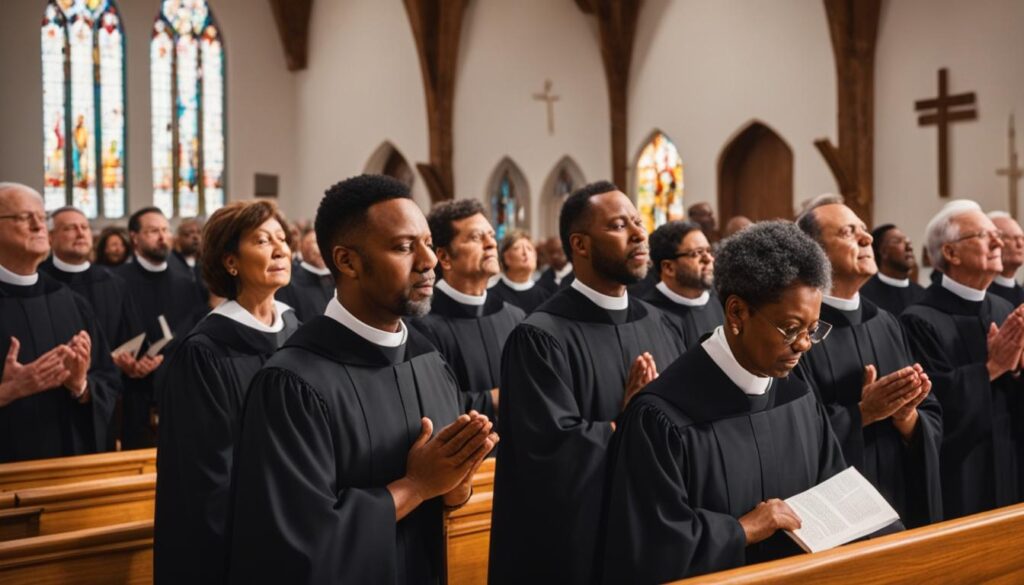
“Leadership is not about being in charge. It is about taking care of those in your charge.” – Simon Sinek
Worship Practices in the Evangelical Free Church
In the Evangelical Free Church, worship is not a passive experience but a participatory event where congregants actively engage in praising and connecting with God. Central to congregational worship are three key elements: music, prayer, and preaching.
Music is an integral part of worship in the Evangelical Free Church. It serves as a powerful tool to express devotion, truth, and emotions. With a wide range of musical styles and expressions, congregants can connect with God in a way that resonates with their hearts. Whether it’s contemporary worship, traditional hymns, or gospel songs, the congregation can lift their voices and unite in adoration through music.
Prayer plays a vital role in worship, serving as a direct line of communication with God. In the Evangelical Free Church, prayer is an avenue for expressing gratitude, seeking guidance, and interceding for others. It is a time where the congregation comes together, joining their hearts and minds in collective conversation with God.
The preaching of God’s Word holds a central place in congregational worship. Bible-centered worship is a hallmark of the Evangelical Free Church, where the Scriptures are revered as the ultimate authority and guide for faith and life. During the preaching, the congregation receives biblical teachings that are relevant to their daily lives. The Word of God is proclaimed, and the congregation is encouraged to apply its truths, wisdom, and principles to their own journeys of faith.
Through worship practices that emphasize music, prayer, and preaching, the Evangelical Free Church seeks to cultivate an environment where congregants can encounter God, grow in their faith, and find inspiration to live out their beliefs. The Word of God remains at the center, guiding and shaping the spiritual journey of the congregation.

- Evangelical Free Church
- Evangelical Free Church of America
Sacred Texts of the Evangelical Free Church
In the Evangelical Free Church, the Bible holds a central and revered position as the sacred text. The authority and inerrancy of the Bible are deeply valued and upheld by the church community. A Bible-centered approach to faith is emphasized, guiding the beliefs, doctrines, and practices of the church.
The recognition of the Bible’s authority extends to its interpretation within the congregation. While there is a strong commitment to its teachings, the Evangelical Free Church allows for interpretive freedom among individuals and local churches. This recognition enables a vibrant and diverse expression of faith, as different perspectives and insights contribute to the richness of the community.
“The Bible is the ultimate source of wisdom, guidance, and inspiration in our journey of faith.” – Pastor David Reynolds
Interpretive freedom within the Evangelical Free Church enables individuals and congregations to explore the depths of scripture, uncovering personal meaning and application. While there are shared core tenets of belief, there is room for nuanced understandings and unique perspectives.
This interpretive freedom is supported by the congregational governance system of the Evangelical Free Church. With local autonomy and decision-making, individual churches have the freedom to foster their own interpretations of scripture, creating a vibrant tapestry of faith within the larger community.

Key Aspects of Sacred Texts in the Evangelical Free Church
- Authority of the Bible: The Bible is seen as the ultimate authority in matters of faith and practice.
- Inerrancy of the Bible: The Evangelical Free Church holds that the Bible is free from error and is wholly reliable in conveying God’s truth.
- Bible-centered approach: The teachings, beliefs, and practices of the Evangelical Free Church are rooted in the Bible, with an emphasis on its centrality in all aspects of life and worship.
- Interpretive freedom: While there are core theological beliefs, the church allows for individual and local church interpretations, recognizing the diverse perspectives and insights that contribute to the community’s faith journey.
Denominations and Sects within Evangelical Free Church
The Evangelical Free Church of America (EFCA) is part of a global network of Evangelical Free Churches that share similar theological foundations and values. While the EFCA operates as an autonomous denomination, it has sister denominations in different parts of the world, including the Evangelical Free Church of Canada and the Evangelical Free Church of China.
The Evangelical Free Church of Canada is an independent denomination that aligns closely with the EFCA in terms of doctrine and practices. It shares a commitment to the authority of the Bible, the atonement through Christ’s sacrifice, and the personal and imminent return of Christ. With congregations spread throughout Canada, the Evangelical Free Church of Canada plays a vital role in spreading the evangelical message in the country.
The Evangelical Free Church of China, on the other hand, operates within the unique context of China and serves as a vibrant community of believers in the Chinese evangelical tradition. Despite the challenges faced by the church in a country where religious freedom is restricted, the Evangelical Free Church of China remains steadfast in its commitment to the evangelical faith and seeks to impact Chinese society through its teachings and witness.
As separate denominations affiliated with the EFCA, the Evangelical Free Church of Canada and the Evangelical Free Church of China contribute to the diverse and global reach of the Evangelical Free Church movement. While each denomination operates autonomously, their collaboration and shared values demonstrate the unity and strength of the evangelical faith.
Community and Outreach in the Evangelical Free Church
The Evangelical Free Church of America (EFCA) is committed to fostering a strong sense of community and making a positive impact in the world through outreach efforts. Local churches affiliated with the EFCA actively engage in serving their communities, participating in missions, and promoting humanitarian efforts.
At the heart of the EFCA’s mission is the belief that embodying the love and compassion of Christ extends beyond the walls of the church. The church recognizes the importance of being actively involved in the local community, meeting tangible needs, and sharing the message of hope and grace.
Through various ministries and initiatives, local EFCA churches strive to strengthen their neighborhoods and cities. They partner with local organizations, such as food banks, homeless shelters, and children’s programs, to offer practical help and support. These efforts are driven by a deep sense of compassion and a desire to demonstrate God’s love in tangible ways.
“We believe that our faith should have a positive impact on the communities we serve. It is our responsibility to be a conduit of God’s love and grace, reaching out to those in need and offering a helping hand. Through our outreach efforts, we aim to bring hope and transformation to individuals and communities.”
Missions play a vital role in the EFCA’s outreach endeavors. The church actively supports missionaries and sends teams to serve in different parts of the world. These missions focus on sharing the gospel, providing humanitarian aid, and empowering local communities to thrive. The EFCA’s commitment to missions reflects its belief in the universal scope of God’s love and the importance of taking the message of salvation to all corners of the earth.
Furthermore, the EFCA is passionate about humanitarian efforts. The church recognizes the pressing needs of the world and strives to be a catalyst for change. Whether it’s offering disaster relief, initiating grassroots projects, or advocating for social justice, the EFCA aims to be a force for good in addressing systemic issues and bringing about lasting transformation.
The community and outreach efforts of the EFCA are driven by a deep sense of compassion, a commitment to the teachings of Jesus, and a passion for making a positive impact. By actively engaging with the local community, participating in missions, and promoting humanitarian efforts, the EFCA seeks to bring hope, healing, and restoration to a broken world.
Architectural and Artistic Features of Evangelical Free Churches
Evangelical Free Churches are characterized by a diverse range of architectural and artistic features, reflecting the unique preferences and traditions of local congregations. While there are no specific requirements for the physical structures of these churches, they often prioritize creating worship spaces that are welcoming, functional, and conducive to congregational participation.
One common architectural feature of Evangelical Free Churches is the use of symbolism in their design. Symbolism is incorporated in various forms, such as stained glass windows, artwork, or architectural elements that hold spiritual significance. These symbols serve to inspire worshippers and enhance their experience within the sacred space.
“The architecture of a church is not merely a building; it is a vessel that carries the sacred beliefs and values of a congregation. It is a visual representation of the divine presence and a reminder of the spiritual journey we all embark upon.”
Artistic features within Evangelical Free Churches can vary widely, encompassing various forms such as sculptures, murals, or mosaics. These artistic expressions often aim to evoke a sense of awe, reverence, and contemplation, enhancing the spiritual atmosphere within the worship space.
Additionally, many Evangelical Free Churches prioritize functionality in their architectural design. The layout and arrangement of seating, podiums, and stage areas are often carefully planned to optimize visibility and participation during worship services. The acoustics of the space may also be given special attention to ensure clear and impactful sermons, music, and congregational singing.
The flexibility of Evangelical Free Church architecture allows for churches to adapt to the changing needs and styles of worship over time. Some churches may incorporate more contemporary elements, while others may choose to preserve traditional architectural features that have historical significance.
Overall, Evangelical Free Churches value the creation of worship spaces that not only facilitate the gathering of believers but also inspire them with architectural and artistic elements that reflect the beauty and depth of their faith.
Contemporary Issues and Challenges Facing the Evangelical Free Church
The Evangelical Free Church of America (EFCA) is not immune to the contemporary issues and challenges that many religious organizations face in today’s society. One of the key challenges is maintaining cultural relevance in an ever-changing world. The EFCA recognizes the need to effectively communicate its beliefs and values to diverse audiences while remaining true to its evangelical roots.
Another challenge is engaging in theological debates that arise within the church and in broader society. As theological perspectives continue to evolve, it is crucial for the EFCA to foster open dialogue and provide a platform for thoughtful discussions. This ensures that the church remains intellectually robust and adaptable without compromising its core convictions.
The EFCA also grapples with the complexities of a diverse membership. With congregants coming from various cultural backgrounds, theological interpretations, and life experiences, navigating unity and harmony can be demanding. However, the EFCA strives to foster an inclusive and affirming community where individuals feel welcomed, valued, and understood.
To address these challenges, the EFCA relies on open dialogue, biblical teachings, and the guidance of the Holy Spirit. By promoting a culture of respectful discourse, the church fosters an environment where individuals can engage meaningfully with contemporary issues and find common ground. Through prayer and discernment, the EFCA seeks to navigate the contemporary landscape with a balance of cultural relevance and theological integrity.
FAQ
What is the history of the Evangelical Free Church?
The Evangelical Free Church of America (EFCA) traces its origins back to the merger of the Swedish Evangelical Free Church and the Norwegian-Danish Evangelical Free Church Association in 1950. The church is characterized by its Radical Pietistic tradition and is affiliated with the National Association of Evangelicals and the International Federation of Free Evangelical Churches.
What are the beliefs and doctrines of the Evangelical Free Church?
The EFCA affirms the authority and inerrancy of the Bible and holds to evangelical beliefs such as the Trinity, atonement through the sacrifice of Jesus Christ, original sin, the personal and imminent return of Christ, and the two ordinances of water baptism and the Lord’s Supper.
What sacraments and rituals are practiced in the Evangelical Free Church?
The EFCA practices two sacraments: water baptism and the Lord’s Supper. These sacraments are seen as symbolic acts of obedience and identification with Christ. The EFCA emphasizes the authority of the local church in determining baptism practices and allows for personal choice in participating in the sacraments.
How is leadership and clergy structured in the Evangelical Free Church?
The EFCA follows a congregational polity, meaning that each local church has autonomy in its governance. The Leadership Conference, composed of credentialed ministers, chaplains, faculty, and church representatives, serves as the governing body and elects the board of directors. The President oversees the work of various national boards and ministries, including the licensing and ordination of ministers.
What are the worship practices in the Evangelical Free Church?
Worship in the EFCA is characterized by congregational participation, with an emphasis on music, prayer, and preaching. The church values Bible-centered worship, where the Word of God is central to the service and scriptural teachings are applied to daily life. Music plays a significant role in worship, with a range of styles and expressions.
What is the significance of the sacred texts in the Evangelical Free Church?
The EFCA recognizes the Bible as its sacred text and affirms its authority and inerrancy. The church emphasizes the importance of a Bible-centered approach to faith and allows for various interpretive freedoms within the congregation. Individual and local church interpretations may vary to some extent due to the congregational governance system.
What denominations and sects are affiliated with the Evangelical Free Church?
The EFCA is part of a larger network of Evangelical Free Churches around the world. The Evangelical Free Church of Canada and the Evangelical Free Church of China are separate denominations affiliated with the EFCA. These denominations operate autonomously but share similar theological foundations and values.
How does the Evangelical Free Church emphasize community and outreach?
The EFCA places a strong emphasis on community and outreach. Local churches actively engage in serving their communities, participating in missions, and promoting humanitarian efforts. The church seeks to make a positive impact at the local level and beyond, embodying the love and compassion of Christ.
What are the architectural and artistic features of Evangelical Free Churches?
Evangelical Free Churches vary in their architectural and artistic features, reflecting the preferences and traditions of local congregations. While there are no specific requirements for their physical structures, many churches strive to create worship spaces that are welcoming, functional, and conducive to congregational participation. Symbolism may be incorporated in various forms, such as stained glass windows or artwork.
What are the contemporary issues and challenges facing the Evangelical Free Church?
The Evangelical Free Church faces various contemporary issues and challenges in today’s society. These include maintaining cultural relevance, engaging in theological debates, and navigating the complexities of a diverse membership. The church seeks to address these challenges through open dialogue, biblical teachings, and the guidance of the Holy Spirit.

